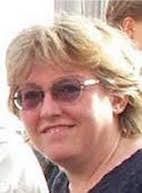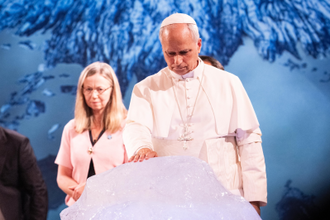Viewpoint: Blessed are the peacemakers and opponents of nuclear weapons

Ellen Teague
My fortieth birthday was a quiet affair. With three exuberant little sons under five years old, my husband and I simply shared a birthday cake with the boys and then, once they were in bed, a take away Indian meal for two. It was the 25 January 1995. My 1995 diary doesn't have an entry for that day, but I know I ended it with a final look at my cards, a final check on the children, a final glance through the frosty window pane at the clear sky and a final prayer of gratitude to God for good health and blessings. It was only some years later I discovered that in the early hours of that day the final curtain had nearly came down on the world as we know it. The world had come within two and a half minutes of an accidental nuclear holocaust.
A military technician in Northern Russia had noticed a blip on his radar screen. A rocket had been launched from off the Norwegian coast and it appeared to originate from a US nuclear submarine - capable of detonating eight nuclear bombs over Moscow within fifteen minutes. Moments later, Russian President Boris Yeltsin, his defence minister, and his chief of staff were informed of the launch. The nuclear command systems switched to combat mode, and the nuclear suitcases carried by Yeltsin and his top commander were activated for the first time in the history of the Soviet-made weapons system. If a response was to be made, it had to be done within ten minutes.
Halfway through the eighth minute, the Russians decided that their country was not under nuclear attack. The rocket was heading out to sea and no longer posed a threat. It was, in fact, a scientific probe sent up to investigate the northern lights. Three more minutes passed, and Yeltsin was informed that the launching was unlikely to be part of a surprise nuclear strike by Western nuclear submarines. These conclusions came minutes before Yeltsin and his commanders should, based on standard launch on warning protocols, have launched a nuclear response. Nine days before, Norway had notified 35 countries, including Russia, of the exact details of the planned launch. The Russian Defense Ministry had received the information but neglected to share it with the on-duty personnel at the early-warning centre. The incident raised serious concerns about the quality of the former Soviet Union's nuclear systems.
The majority of people in the Western world did not find out for several years - too late to generate either outrage or serious reflection. My 1995 diary does have an entry for the day following. It says, "nursery closed". If I remember rightly, the nursery building attended by my four-year-old had a burst pipe and flooding due to the icy weather. That was regarded as a major crisis by the small circle of families who used the nursery. How unaware we all were of the greater danger facing us, and jeopardising the futures of all our children.
Nuclear controls
The Nuclear Nonproliferation Treaty (NPT) has been the world’s best bulwark for more than 30 years against the unlimited spread of nuclear weapons. However, if their proliferation continues, it may be inevitable that at some point, by either accident or by miscalculation or by computer malfunction, or by malice or madness, somewhere, somebody will actually use a nuclear weapon. There is deep concern over the acquisition of nuclear weapons by volatile countries such as North Korea, India and Pakistan, but let us not forget that the only times they were used, and on a civilian population, was by the US.
More than 70 years after the world witnessed the devastating power of nuclear weapons, a global treaty was approved just last month to ban these bombs, a move that supporters hope will lead to the eventual elimination of all nuclear arms. The treaty was endorsed by 122 countries at United Nations headquarters in New York after months of talks in the face of strong opposition from nuclear-armed states and their allies. All of the countries that bear nuclear arms and many others that either come under their protection or host weapons on their soil boycotted the negotiations. The most vocal critic of the discussions, the US, pointed to the escalation of North Korea’s nuclear and ballistic missile programme as one reason to retain its nuclear capability. The UK did not attend the talks despite government claims to support multilateral disarmament.
The dangers
Since the end of the Cold War, many ordinary people have taken the view that nuclear weapon dangers are behind us. Nuclear weapons are now in the hands of eight states: the US, Russia, China, UK, France, Israel, India and Pakistan. North Korea may have developed them, and Iran might do so. So far, there is no evidence that nuclear weapon material or technology has passed into the hands of those whom we now call terrorists but there is clearly a danger that it could do so.
There are in the world today around 15,000 nuclear weapons. Worse, pre-emptive war outside the restrictions of the UN charter, is now being made an option. Gone are the days when the purpose of nuclear weapons was thought by the general public to be to deter their use by anyone else. Now, despite their horrendous effects, nuclear weapons are again being discussed as a usable means of waging war.
And the current stand-off between the US and North Korea over the latter’s nuclear wepaons programme is fraught with danger. Trump wants North Korea to be “very nervous”. Well, I’m certainly feeling nervous, especially since so many Americans can’t even place the Korean peninsula on a map and appear to know so little about nuclear weapons.
Seizing an opportunity
The Christian churches have a vital role to play, in the view of Bruce Kent, a Vice-President of both the Campaign for Nuclear Disarmament (CND) and Pax Christi UK. “One does not have to be a high grade moral theologian to realise that, ‘Do as I say, not as I do’ will never be an effective formula for disarmament” he says. He regrets that, at the height of the Cold War in the 1980s, the churches played an ambiguous role. “Official teaching was that nuclear deterrence could be tolerated temporarily, despite the wicked threats it entailed, as the best we could manage while the disarmers were busy disarming - would that such had been their intention” he suggests. Now, the Church has a clear stance against nuclear weapons.
In March, Pope Francis sent a message to the UN Conference in New York saying, “the ultimate goal of the total elimination of nuclear weapons becomes both a challenge and a moral and humanitarian imperative”. Church leaders in the US, South Korea, Japan and Guam have all called for a diplomatic solution to the current crisis. In Bruce Kent’s view, either a process of negotiating a treaty aimed at the elimination of all nuclear weapons everywhere begins, or the world’s peoples face ever increasing dangers from nuclear accidents, nuclear proliferation and deliberate use of nuclear weapons.
Over 50 years ago, less than two weeks after the bomb was dropped on Nagasaki, British Prime Minister Clement Atlee said in a memo: “We should declare that this invention has made it essential to end wars. The new world order must start now.” It did not. The current combined explosive yield of the nuclear weapons on high alert world wide is 200,000 times the force of the Hiroshima bomb. Joseph Rotblat, a nuclear physicist who was involved in the creation of the first atom bomb but later became a vocal critic of the nuclear arms race, said at the 2003 AGM of the Movement for the Abolition of War: "Nuclear weapons are the most horrific invention ever made in science. Their destructive power is millions of times greater than from ordinary explosives. On top of this, they leave a residue of radioactive poison that would cause death in generations yet to be born. Their large- scale use could bring our civilization to an end and threaten the very existence of the human race. For these reasons nuclear weapons have been seen from the beginning as immoral tools of war."
This is a crucial time in the global struggle for a peaceful future and freedom from fear. We owe it to our young people and to the whole Earth community to stay engaged with active peacemaking, stop tolerating nuclear weapons and retain a positive vision for peaceful world. Let us encourage diplomacy to resolve tensions and discourage confrontational rhetoric. Let us pray for peace, resist arms trading, support moves to abolish nuclear weapons, and refuse to endorse the incredibly expensive and immoral upgrading of Britain’s Trident nuclear weapons. Pax Christi International said yesterday: “We hold up the testimony of the victims of Hiroshima and Nagasaki to remind the world of the horrific, unconscionable consequences of the use of nuclear weapons, and we join with all those encouraging diplomacy as a path to peace.” Amen to that!
Links:
www.theguardian.com/world/unitednations
See also: ICN 10 August 2017: Prayers for peace at Westminster Cathedral and Battersea + video www.indcatholicnews.com/news/33158


















